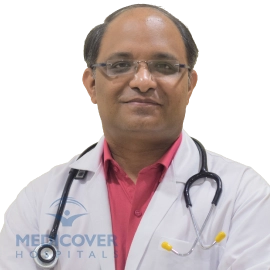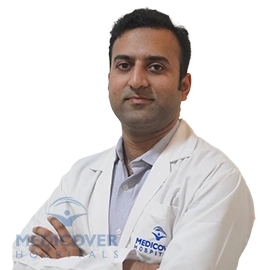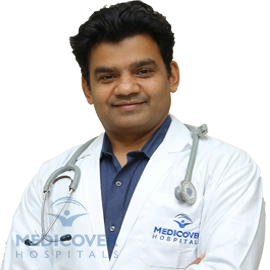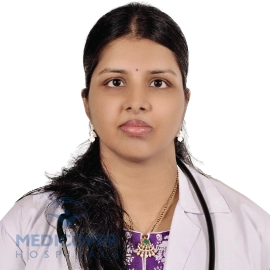Best Neurologists in India

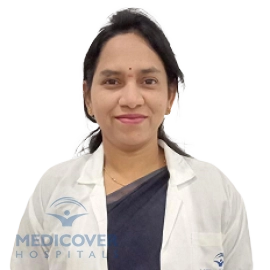
- Exp:12+ Yrs

- Exp:35+ Yrs


- Exp:10+ Yrs
The department of Neurology, Medicover Hospitals has the top and best neurology specialists with top notch experience. The department is equipped with
- Advanced technology in MRI
- Rehabilitation
- Neuro-critical patient care facilities
We provide the best neurological care because our treatment facilities are up-to-date with accurate and advanced instrumentation and tools.
Our neurology department has expertise and training in managing various conditions and diseases associated with the brain and the nervous system.
Our team includes some of the best neurologists in India, known for their excellence in diagnosing and treating complex neurological disorders. With a focus on providing specialized care, our specialists are recognized as among the top neurologists in India, ensuring the best possible outcomes for our patients.
Neuro Specialist: Conditions Treated Include
The neurology specialists treats diseases such as:
- Dystonia
- Seizure
- Alzheimer's Disease
- Dementia
- Strokes
- Brain Injury
- Headache
- Tumors
- Migraines
- Disc-related Problems
- Neuropathies
- Spine Disorders
Medicover Hospital is the best neuro specialist hospital in India, and patient care has been our highest priority. Our neuro doctors in the department are adept at all neurosurgical procedures.
Expert Neuro specialist at Medicover
At Medicover Hospitals, our neuro specialist doctors offer expertise in both invasive and non-invasive procedures, along with emergency neurological care. We use advanced neurological imaging for accurate diagnosis and specialize in pediatric neurology to provide complete care for all ages.
- Invasive and non-invasive procedures
- Emergency neurological care
- Neurological imaging
- Pediatric neurology
Importance of Consulting Neuro Doctors
Consulting a neurologist is essential for diagnosing and managing conditions affecting the brain, spinal cord, and nerves. Neurological diseases can impact motor skills, memory, and overall quality of life. Early consultation with the best neurologist doctor in India ensures timely intervention and effective treatment strategies tailored to individual needs.
- Early detection of neurological disorders.
- Expert diagnosis and treatment for complex cases.
- Guidance on managing chronic neurological conditions.
- Access to advanced tests like MRI and EEG.
- Specialized care from a neuro specialist doctor near me.
- Recommendations for therapy and lifestyle changes.
- Collaborative care with surgeons if surgery is required.
The Role of a Neurologist at Medicover
A neurologist is a doctor with specialized training in diagnosing and treating disorders of the brain, spinal cord, and nerves. They assist with headaches, strokes, epilepsy, Parkinson's, and multiple sclerosis. In essence, neurologists deal with the nervous system and help individuals detect control issues that impact how it functions.
At Medicover, our doctors in neurology are highly skilled in managing complex neurological disorders, offering advanced treatment options. As recognized best brain doctors in India, they work with advanced diagnostic tools to ensure accurate assessments and effective treatment plans for all patients.
Why Choose Nephrologist at Medicover?
Medicover Hospital is renowned for offering advanced care through some of the top neurologist doctors in India, supported by advanced facilities and a dedicated team.
- Expert Care: Specialists managing a wide range of neurological conditions.
- Accurate Diagnosis: Advanced tools for precise assessment.
- Advanced Treatment: Expertise in treating complex disorders.
- Pediatric Neurology: Care for both adult and pediatric patients.
- Trusted Choice: A leading neurology hospital in India with a strong reputation.

Frequently Asked Questions
What makes Medicover Hospitals the best choice for neurological care?
Medicover Hospitals has skilled neurologists, modern diagnostic tools, and personalized care plans for effective neurological treatments.
What are the early warning signs of neurological disorders?
Early warning signs of neurological disorders can include persistent headaches, sudden vision changes, weakness or numbness in limbs, difficulty speaking, memory loss, tremors, and coordination problems.
Can neurological disorders be prevented?
Neurological disorders may be partially prevented by maintaining a healthy lifestyle, managing risk factors (e.g., blood pressure, infections), and avoiding toxins. Genetic conditions often cannot be fully prevented.
What diagnostic tests are commonly used in neurology?
Neurologists use various diagnostic tests to identify neurological disorders, including MRI (Magnetic Resonance Imaging), CT scans, EEG (Electroencephalography), nerve conduction studies, lumbar punctures, and blood tests.
When to visit a neurologist?
Visit a neurologist if you experience persistent headaches, seizures, memory issues, dizziness, numbness, muscle weakness, or coordination problems, or if referred by your primary care doctor.
Can a neurologist detect nerve damage?
Yes, a neurologist can detect nerve damage through a combination of physical examinations, patient history, and diagnostic tests such as nerve conduction studies, electromyography (EMG), and imaging techniques. These tests help pinpoint the location and extent of nerve damage.
Can an MRI show nerve damage?
An MRI (Magnetic Resonance Imaging) can help show nerve damage, especially in the brain and spinal cord.
How can I book an appointment with a nephrologist at Medicover Hospitals?
You can book an appointment with a nephrologist at Medicover Hospitals through their website, by calling their helpline, or by visiting the nearest Medicover Hospital directly.
Click here to request a callback!



